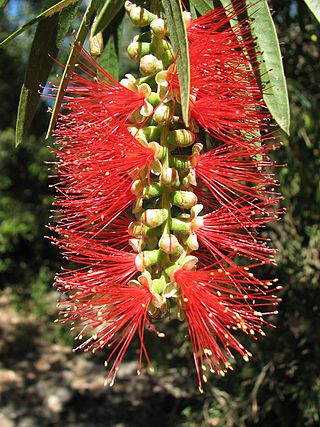
Callistemon is a genus of shrubs in the family Myrtaceae, first described as a genus in 1814. The entire genus is endemic to Australia but widely cultivated in many other regions and naturalised in scattered locations. Their status as a separate taxon is in doubt, some authorities accepting that the difference between callistemons and melaleucas is not sufficient for them to be grouped in a separate genus.

Melaleuca viminalis, commonly known as weeping bottlebrush or creek bottlebrush, is a plant in the myrtle family Myrtaceae, and is endemic to New South Wales, Queensland and Western Australia. It is a multi-trunked, large shrub or tree with hard bark, often pendulous foliage and large numbers of bright red bottlebrush flowers in spring and summer. It is possibly the most commonly cultivated melaleuca in gardens and its cultivars are often grown in many countries.

Melaleuca linearis, commonly known as narrow-leaved bottlebrush, is a plant in the myrtle family, Myrtaceae and is endemic to New South Wales and Queensland in Australia. It is a medium-sized shrub with narrow leaves with a rigid point, and red flower spikes in late spring or early summer.
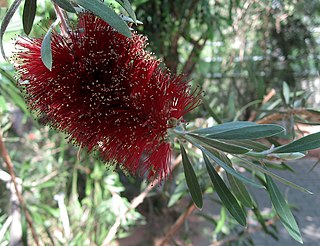
Melaleuca pachyphylla, commonly known as wallum bottlebrush, is a plant in the myrtle family Myrtaceae, and is endemic to near-coastal regions of New South Wales and Queensland in Australia.. It is a medium-sized shrub with a straggling habit and red, or sometimes greenish, bottlebrush flowers in summer.

Melaleuca phoenicea, commonly known as scarlet bottlebrush or lesser bottlebrush, is a plant in the myrtle family, Myrtaceae and is endemic to the south-west of Western Australia. The Noongar peoples know the plant as tubada. It is a shrub with thick, blue-green leaves and spikes of scarlet bottlebrush flowers in spring and summer.

Melaleuca orophila, commonly known as needle bottlebrush or Flinders Ranges bottlebrush, is a plant in the myrtle family, Myrtaceae and is endemic to the eastern part of South Australia.. It is a medium-sized shrub with sharp-pointed, needle-like leaves and bright red bottlebrush flower spikes.
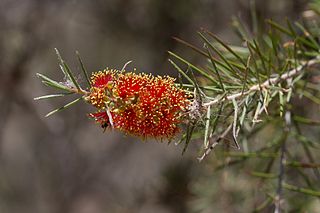
Melaleuca brachyandra, commonly known as prickly bottlebrush or scarlet bottlebrush, is a plant in the myrtle family, Myrtaceae and is endemic to New South Wales, Victoria and South Australia in Australia. It is a shrub or small tree with narrow leaves and showy red and green flowers making it an ideal ornamental plant in temperate areas.

Melaleuca recurva, commonly known as Tinaroo bottlebrush, is a plant in the myrtle family, Myrtaceae and is endemic to higher areas of far northern Queensland in Australia.. It is a shrub with spikes of red flowers tipped with yellow in most months of the year and which often has leaves with their edges curled under.

The Betka River is a perennial river with no defined major catchment, located in the East Gippsland region of the Australian state of Victoria.
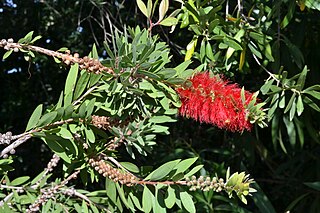
Melaleuca citrina, the common red bottlebrush, crimson bottlebrush, or lemon bottlebrush, is a plant in the myrtle family Myrtaceae, and is endemic to eastern Australia. Some Australian state herbaria continue to use the name Callistemon citrinus. It is a hardy and adaptable species, common in its natural habitat. It is widely cultivated, not only in Australia. It was one of the first Australian plants to be grown outside the country, having been taken to England in 1770 by Joseph Banks. Its showy red flower spikes, present over most of the year in an ideal situation, account for its popularity.

Melaleuca pallida, commonly known as lemon bottlebrush, is a plant in the myrtle family, Myrtaceae and is endemic to eastern Australia. It is an upright shrub with thin, spreading branches, silvery new growth and pale yellow, sometimes pinkish bottlebrush flowers.

Melaleuca flammea, commonly known as tapering-leaved bottlebrush, is a plant in the myrtle family, Myrtaceae and is endemic to New South Wales and Queensland in Australia. It is a shrub with broad, lance-shaped leaves which have wavy edges and taper gradually to a fine point. In spring it has typical bottlebrush flowers whose fiery colour gives the species its name.
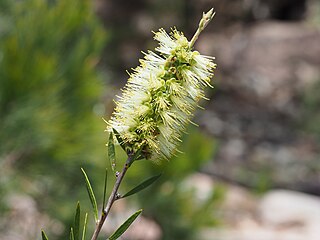
Melaleuca flavovirens, commonly known as green bottlebrush is a plant in the myrtle family, Myrtaceae and is endemic to a small area near the New South Wales–Queensland border in Australia. It is a stiff shrub, distinguished by its silvery new growth and spikes of greenish flowers with yellow tips.

Melaleuca formosa, commonly known as Kingaroy bottlebrush or cliff bottlebrush is a plant in the myrtle family, Myrtaceae and is endemic to a small area in Queensland and peripherally in New South Wales, Australia. It is a shrub with weeping branches and spikes of lemon-coloured flowers in spring.
Melaleuca hemisticta, commonly known as Mount Wheeler bottlebrush is a plant in the myrtle family, Myrtaceae and is endemic to coastal areas of Queensland. It is a tall, bushy shrub with dark green leaves and red flowers spikes tipped with yellow.

Melaleuca megalongensis, commonly known as Megalong Valley bottlebrush, is a plant in the myrtle family, Myrtaceae and is endemic to New South Wales.. It is a shrub similar to Melaleuca citrina which occurs in the same area and is difficult to distinguish from it, except when in flower.
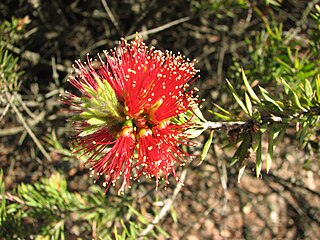
Melaleuca pearsonii, commonly known as Blackdown bottlebrush, is a plant in the myrtle family, Myrtaceae and is endemic to Queensland in Australia. It is a small, spreading but compact shrub with hard bark, soft foliage and profuse spikes of bottlebrush flowers in spring and summer.

Melaleuca serpentina is a plant in the myrtle family, Myrtaceae and is endemic to the Barraba district in Australia. It is a shrub with yellow or creamy-green bottlebrush flowers. It is similar to Melaleuca citrina but can be distinguished from that species by its flower colour and its shorter stamens.

Melaleuca virens, commonly known as lime bottlebrush, is a plant in the myrtle family, Myrtaceae and is endemic to Tasmania in Australia. It is one of only two melaleucas endemic to Tasmania, the other being Melaleuca pustulata although another six also occur there. A small to medium shrub growing mostly in subalpine areas, it has hard, leathery, sharply pointed leaves and spikes of yellow or greenish flowers in early summer,

Melaleuca wimmerensis, commonly known as the Wimmera bottlebrush, is a plant in the myrtle family, Myrtaceae and is endemic to the state of Victoria in Australia.. It is a recently (2008) discovered shrub, often with many stems arising from a lignotuber and is similar to Melaleuca paludicola but has pink or mauve flowers tipped with yellow anthers over a short period between October and early December.




















